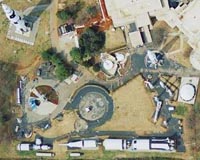 |
Bethesda MD (SPX) Nov 09, 2009 The U.S. human space program and the creation of new technologies for all humans are in peril if NASA deviates from its plan to explore the Moon and Mars. NASA should stay the course. A committee led by former Lockheed Martin CEO, Norm Augustine, has developed several options and recommendations for NASA that, if implemented, would have to be thoroughly evaluated before NASA could move forward. This could, in our opinion, cause NASA to... + Lose the momentum of space exploration and the U.S. to lose leadership in space + Lose thousands of jobs at NASA and in the aerospace industry of experienced engineers, scientists, and mathematicians + Curtail the development of new technologies that would benefit every U.S. citizen + Exacerbate the time gap when the shuttle discontinues taking humans to space and a new transportation system is on-line. + We would have to depend on Russia for our human space transportation. + Prematurely rely on unproven and non-existent commercial space systems which would increase the probability of failures and increased costs. Our recommendations, based on our decades of experiences associated with the success of every human space program from the first man in space to today, are to... + Provide NASA with adequate budgets to effectively and efficiently stay the course on the Moon/Mars programs + Continue the operations of the Shuttle until a proven and viable replacement exists + Complete the Space Station - a space scientific research facility - and enable sufficient time and opportunities for scientists around the world to perform research and hopefully develop new technologies and products that would benefit all humans. + Continue to encourage, enable and indemnify the development of commercial space systems currently in progress. + Continue the development of new technologies (e.g. ion propulsion and advanced power systems), which have been neglected over the last 20 years, that will have significant impact on future mission planning. + Enable NASA to provide the leadership to continue space exploration and to encourage international participation in future deep-space missions. + Continue to reap, without interruption, the benefits of space exploration that benefits every U.S citizen every day - microelectronics (cell phones, PDA's, iPods, digital cameras, computers, etc.), weather satellites, imaging satellites, communication satellites, global positioning systems (GPS), medical and industrial laser devices, and management systems for large complex technology programs. NASA has consistently shown the ability to lead the nation's civilian space program, and as such, should be the organization that provides the White House and Congress with the proper steps to assure continued U.S. leadership in space endeavors. Share This Article With Planet Earth
Related Links Launchspace The latest information about the Commercial Satellite Industry
 AFSPC Reaches Out To Space Camp Youth
AFSPC Reaches Out To Space Camp YouthPeterson AFB CO (SPX) Nov 04, 2009 Could a U.S. Space and Rocket Center, Space Camp grad be the next U.S Air Force F-16 Pilot or GPS System operator? The Air Force only hopes so. The U.S. Space and Rocket Center is located in Huntsville, Alabama. "Space Camp" is what the center is commonly known as and provides residental and day camp educational programs for children in various age groups and adults. Space Camp is a series ... read more |
|
| The content herein, unless otherwise known to be public domain, are Copyright 1995-2009 - SpaceDaily. AFP and UPI Wire Stories are copyright Agence France-Presse and United Press International. ESA Portal Reports are copyright European Space Agency. All NASA sourced material is public domain. Additional copyrights may apply in whole or part to other bona fide parties. Advertising does not imply endorsement,agreement or approval of any opinions, statements or information provided by SpaceDaily on any Web page published or hosted by SpaceDaily. Privacy Statement |